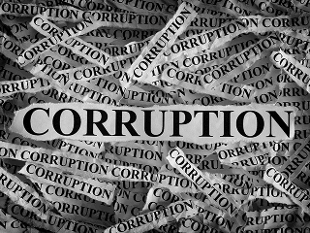This material belongs to: The Gleaner.
You live in a society where everybody steals. Do you choose to steal? The probability that you will be caught is low because the police are very busy chasing other thieves, and, even if you do get caught, the chances of your being punished severely for a crime that is so common are low. Therefore, you too steal.
By contrast, if you live in a society where theft is rare, the chances of your being caught and punished are high, so you choose not to steal.
This scenario, laid out by Paolo Mauro, can be applied to Jamaica and other societies as we attempt to understand corruption, trust in institutions, and the rule of law.
Trust produces an honest political system. It promotes economic growth. Corruption destroys more than the economy of a country. It tears apart the moral fibre of the society, diminishes respect for the law, and ultimately, our faith in others. When elites exploit the State for their own gain, the public comes to accept theft as a part of daily life. Corrupt leaders breed distrust throughout a society and reflects the Chinese expression: “the fish rots from the head down.”
If corruption is believed to be widespread among government leaders, and there is a culture of limited accountability (very few charges, prosecution and conviction to date), then this speaks to possible weakness in institutions and government officials who make and implement policy, suggesting that they are not acting in the public’s interest. And thus, they cannot be counted on to create, implement and enforce policies to induce the police and other lower-level bureaucrats to avoid corruption.
Economic Institutions

Widespread corruption in a society is often the result of weak institutions. Thus, what factors create weak institutions? As Acemoglu, Johnson and Robinson postulate, political institutions determine economic institutions because political institutions determine who holds power, and those who hold power are the ones who define the economic rules of the game. Reason being: those who hold power cannot credibly commit to how they will use, and/or abuse, their power once they have it. It seems that the tendency is for them to choose institutions that are more likely to benefit themselves, rather than the country as a whole.
As it relates to political institutions, corruption hinders the development of political parties because the high premium of controlling offices resulting from corruption yields political machines that are rent-seeking, instead of political parties that are preference-integrating and trust-enhancing.
Corruption affects legitimacy of gov’ts
Corruption reduces institutional trust in a number of ways. Noted corruption scholars Mauro and Rothstein both agree that trust is marginally significant for tax evasion, while tax evasion very strongly tracks the level of corruption in society. People see corrupt governments and believe that it is acceptable to steal and especially to withhold their taxes, otherwise their hard-earned money would go directly into the pockets of the corrupt politicians. This ultimately affects the institutions in society and the legitimacy of a government.
Assessing more closely, as it relates to trust and corruption, corruption seems to matter for adherence to the law and for red tape in the bureaucracy. According to Uslaner, “most of the time, it is trust that matters most. Trusting governments, more than honest governments, spend a greater share of their gross domestic product on government, spend more for education and on the public sector more generally, and have better-functioning judiciaries and greater political stability”. Thus, if the society lacks trust in the government, and/or its institutions, it poses a hindrance to development and growth.
Corruption has been, and continues to be, a significant challenge for Jamaica. There is widespread belief that many government institutions, perhaps none more than the police, is rife with corruption, bribery, lack of accountability and thereby compromising the security of citizens.
The primary task of the police force is to serve and protect the Jamaican public; but corruption, nepotism, favouritism and a lack of professionalism undoubtedly undermine the functions of the police force. With the public perception that the police force is among the most corrupt institutions, band-aid solutions will not yield significant results.
There is need for urgent system reform in Jamaica
In 2015, the United States Government handed over 10 vessels, worth approximately US$1.5 million, to the Jamaica Constabulary Force (JCF). Perhaps the most newsworthy event with those boats has been that one was stolen – and eventually recovered.
The question as it pertains to strategic and maximum use of resources given to the Jamaican government comes to the fore. While the public would not expect the JCF to disclose strategic operations, the question should be raised about whether the southern coast, especially, is properly covered.
Are the resources donated being effectively used? How many drug and/or gun shipments have been intercepted? How many guns being smuggled into the island have been intercepted? What is the level of corruption within the force as it pertains to officers allegedly connected with individuals in the illicit economy of narcotics trafficking? Are allegedly ‘known’ corrupt cops simply being moved around or reassigned rather than being forced out of the JCF and/or prosecuted?
Brought to justice
Transparency is the enemy of corruption. Corruption transfers resources from the general public to the elites and generally from the poor to the rich. It acts as an extra tax on citizens, leaving less money for public expenditures. Laws may set out fierce punishments, yet most bad deeds go unpunished. We can tinker with restructuring institutions or even our political system, or we can put political leaders in jail. But until the society reaches its breaking point and engages in holistic means of system reform, little will change.
Perhaps as we watch Brazil, mired in corruption scandals, investigations, the arrest and trials of former and current politicians, senior government officials and private-sector individuals for various acts of corruption, societies like Jamaica will hopefully see that in due time, corrupt officials who act with impunity, seemingly flouting the law, will be brought to justice. But does Brazil, like other developing and emerging market economies, epitomises the fish rotting from the head down, or is it corruption ingrained into the political culture of the society?
– Dr Omar E. Hawthorne is lecturer in international relations at the UWI, Mona, and author of ‘Do International Corruption Metrics Matter?’


